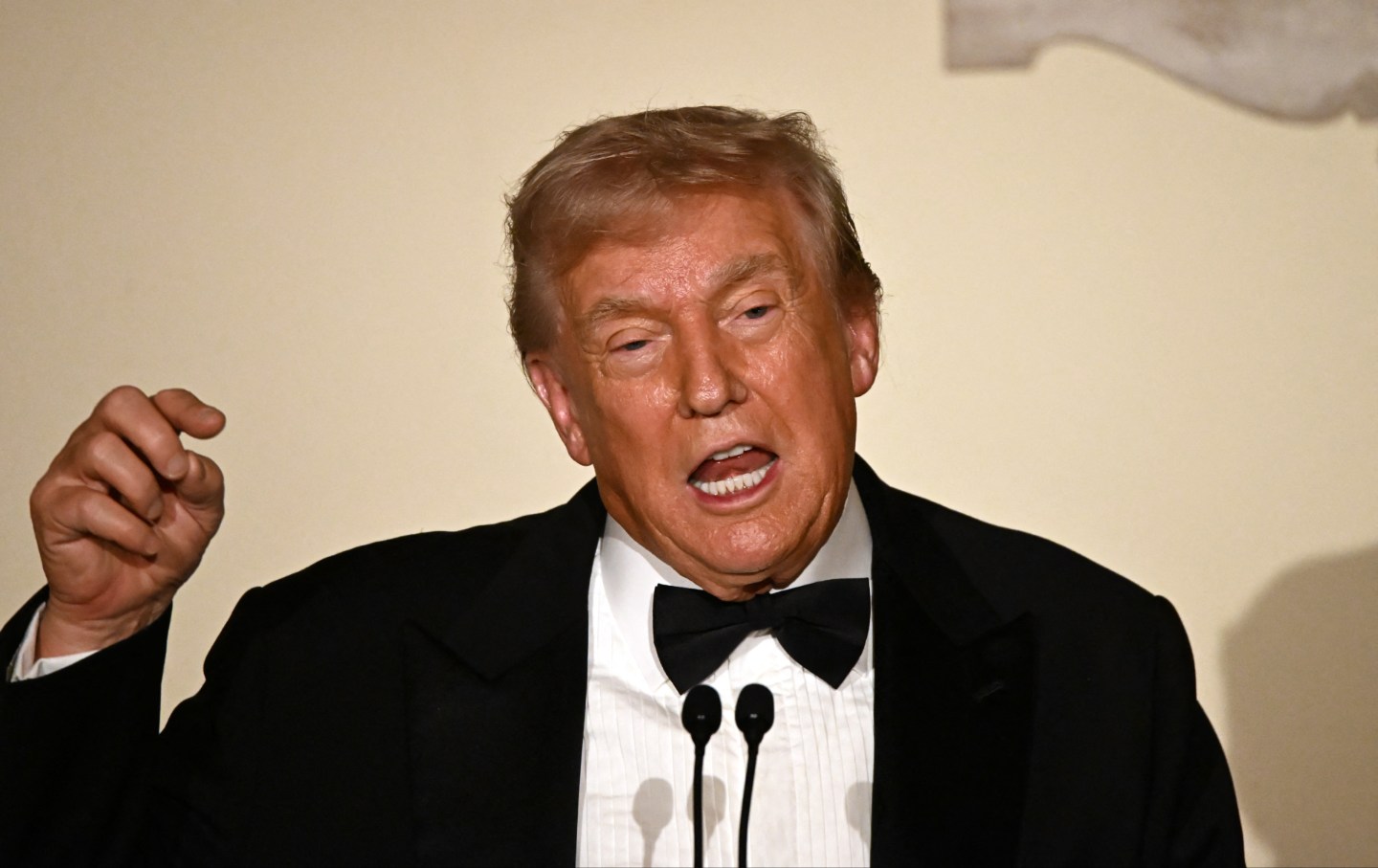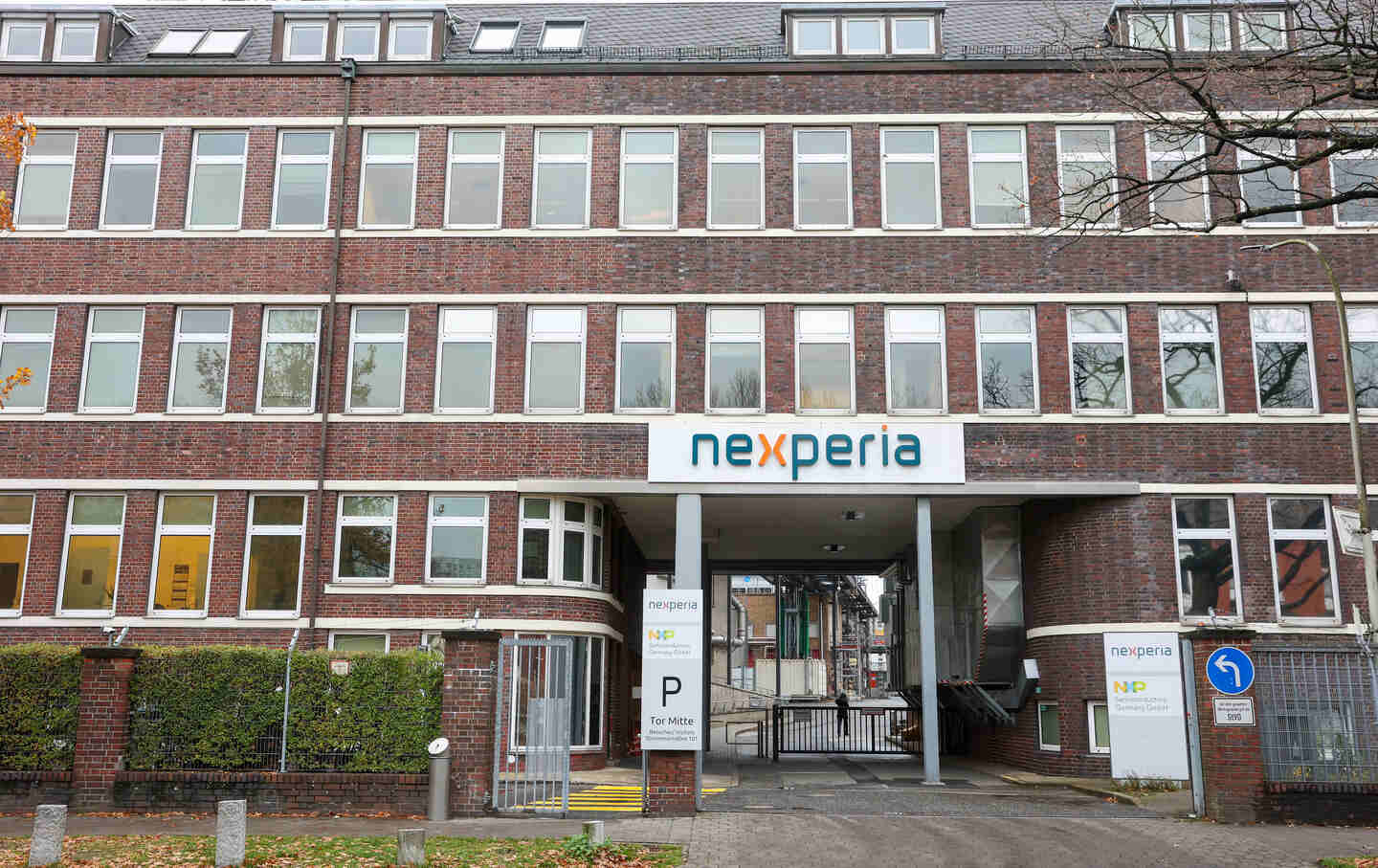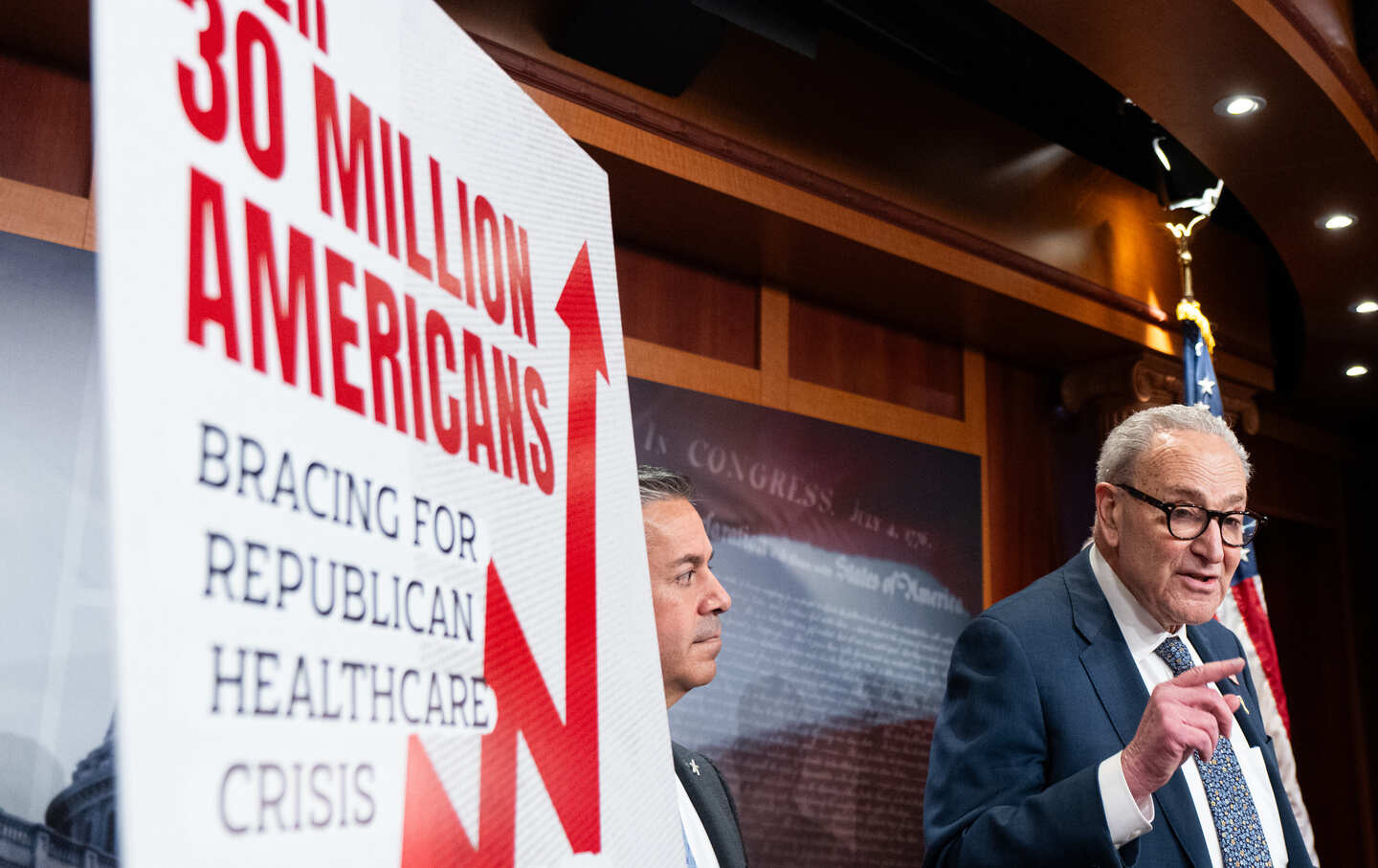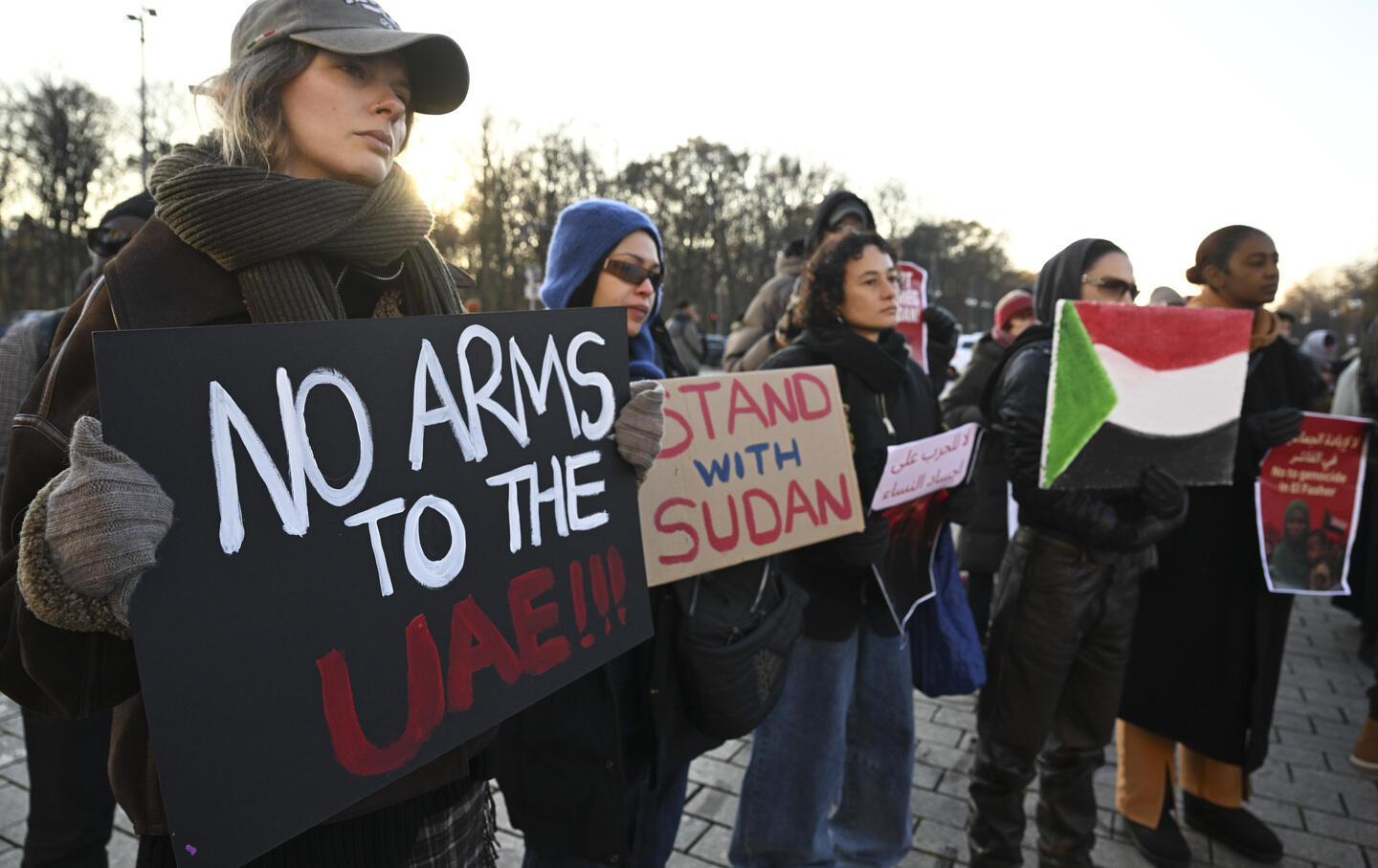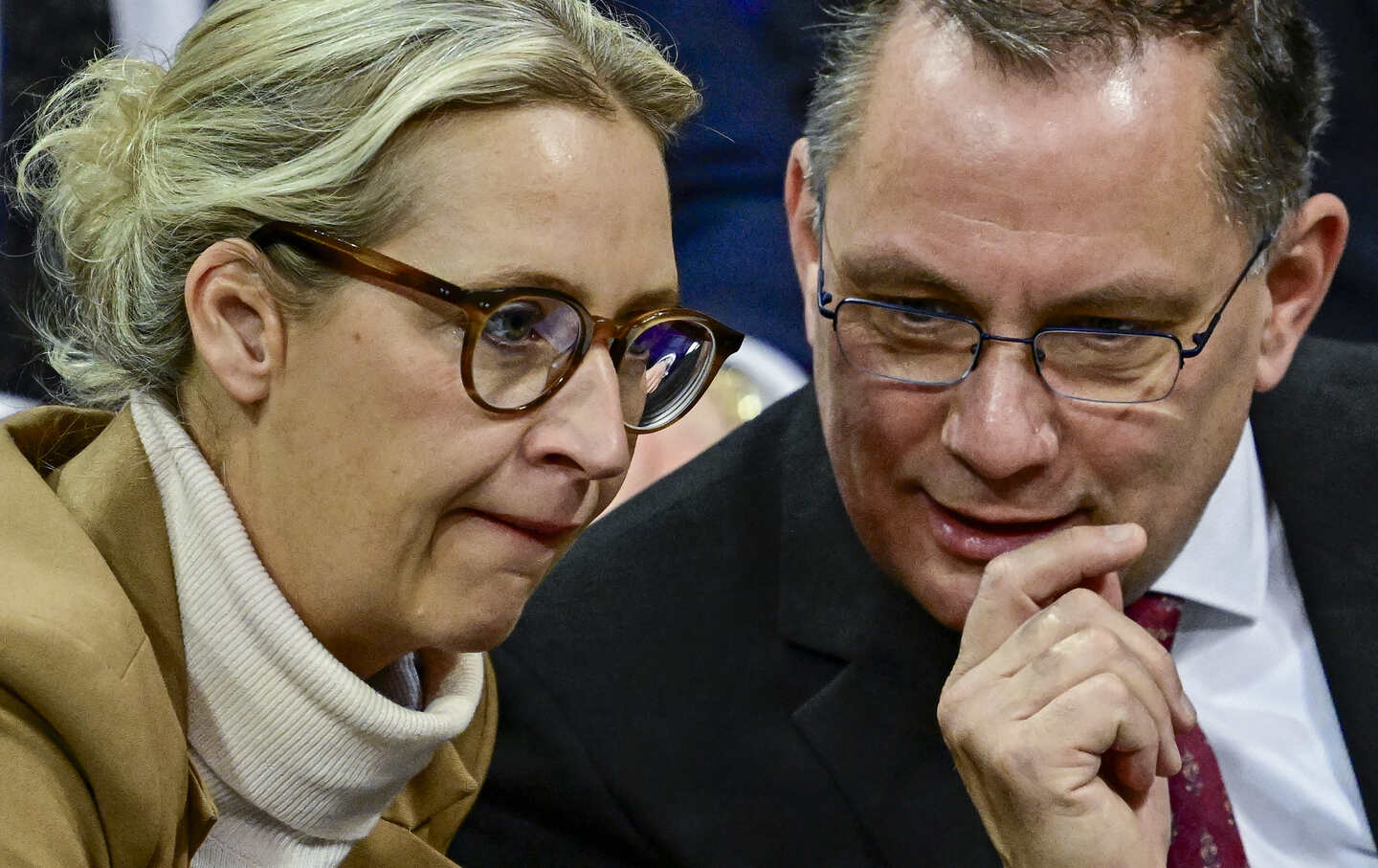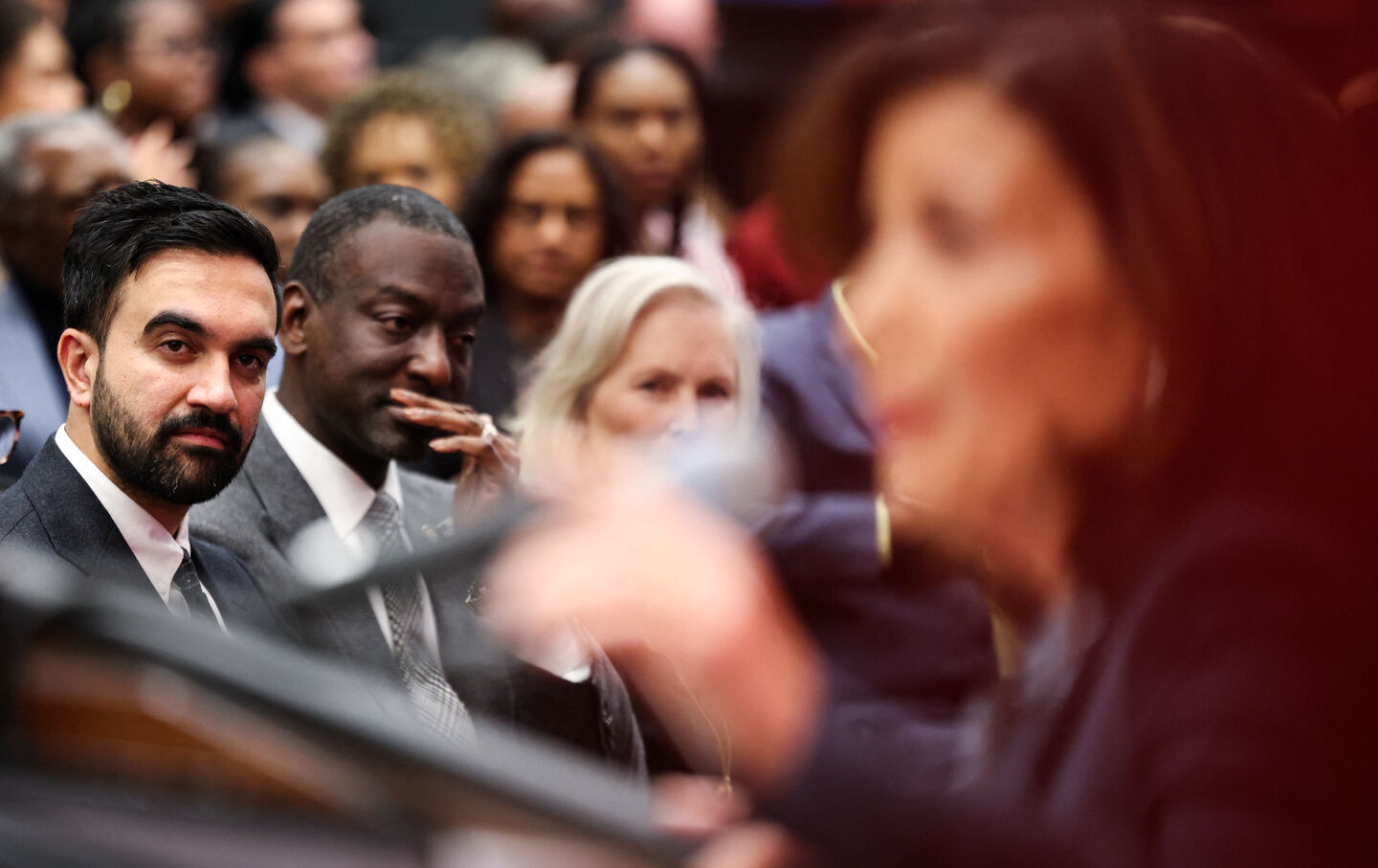Travels in Trumpland—Plus, the Fight Over “Freedom”
On this episode of Start Making Sense, John Nichols reports on Democrats in Red districts, and Eric Foner talks about Kamala’s campaign to claim a key concept of Reaganism.

Here's where to find podcasts from The Nation. Political talk without the boring parts, featuring the writers, activists and artists who shape the news, from a progressive perspective.
John Nichols has been driving to places in middle America where Trump has gotten big majorities in the past: Iowa and Nebraska, central and Western Illinois, and southwestern Wisconsin, asking Democrats there about politics in their towns right now.
Also: Kamala’s campaign is challenging the Republican conception of “freedom” as freedom from government regulation, advancing instead a positive conception of the government’s ability to protect and expand freedom. Eric Foner explains the history, and significance, of this conflict.
Our Sponsors:
* Check out Avocado Green Mattress: https://avocadogreenmattress.com
Advertising Inquiries: https://redcircle.com/brands
Privacy & Opt-Out: https://redcircle.com/privacy
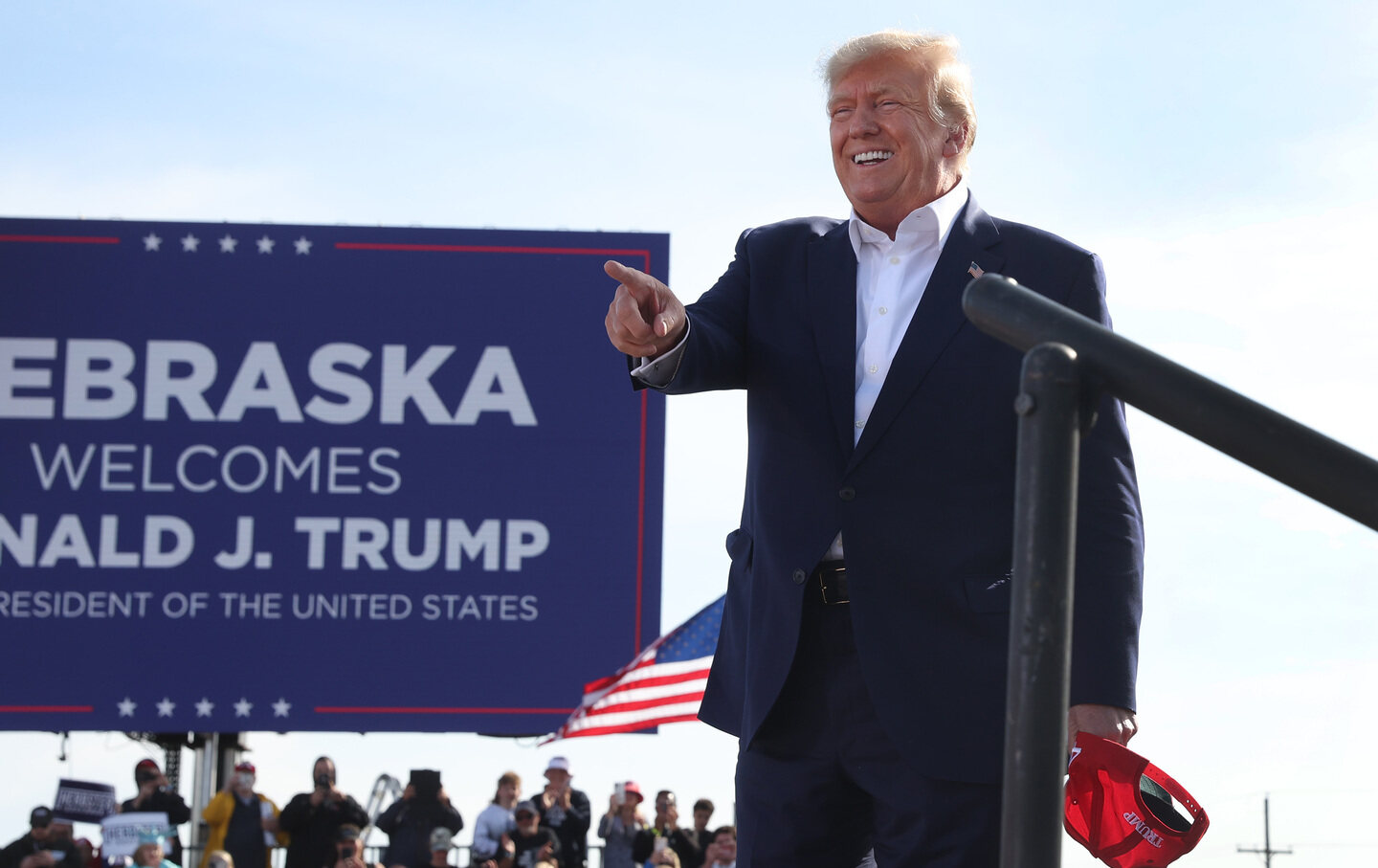
Donald Trump arriving for a rally at the I-80 Speedway, on May 1, 2022, in Greenwood, Nebraska.
(Scott Olson / Getty Images)John Nichols has been driving to places in Middle America where Trump has gotten big majorities in the past: Iowa and Nebraska, central and western Illinois, and southwestern Wisconsin, asking Democrats there about politics in their towns right now. He’s on the podcast this week to discuss.
Also on this episode: Kamala Harris’s campaign is challenging the Republican conception of “freedom” as freedom from government regulation, advancing instead a positive conception of the government’s ability to protect and expand personal freedom. Eric Foner explains the history, and significance, of this conflict.

Here's where to find podcasts from The Nation. Political talk without the boring parts, featuring the writers, activists and artists who shape the news, from a progressive perspective.
Republicans are about to end Obamcare subsidies, driving up premiums for 20 million people during the year of the midterm elections. How have they managed to end up after all these years with no health insurance plan of their own? John Nichols comments.
Also: Bob Dylan’s earliest recordings have just been released—the first is from 1956 when he was 15 years old—on the 8-CD set ‘Through the Open Window: The Bootleg Series vol. 18” – which ends in 1963, with his historic performance at Carnegie Hall. Sean Wilentz explains – he wrote the 120 page book that accompanies the release.
Our Sponsors:
* Check out Avocado Green Mattress: https://avocadogreenmattress.com
Advertising Inquiries: https://redcircle.com/brands
Privacy & Opt-Out: https://redcircle.com/privacy
Jon Wiener: From The Nation magazine, this is Start Making Sense. I’m Jon Wiener. Later in the show: The Fight over “Freedom” – Kamala’s campaign is challenging the Republican conception of “freedom”—advancing a positive conception of the government’s ability to protect and expand freedom. Historian Eric Foner will explain. But first: travels in Trumpland – John Nichols will report – in a minute.
[BREAK]
Travels in Trumpland – John Nichols has been driving to places in middle America where Trump has gotten big majorities in the past. Iowa and Nebraska, central and Western Illinois, Indiana and Kentucky, asking Democrats there about politics in their towns right now. Of course, John is national affairs correspondent for The Nation. We reached him today at home in Madison. John, welcome back.
John Nichols: Jon, it is great to be with you.
JW: A lot of the places that you visited in what is now Trump country voted Democratic once upon a time. It’s hard to remember, but how long ago did Democrats carry, for example, the red states of Iowa, Ohio and Indiana?
JN: Well Jon, a youngster like you will not recall that Barack Obama actually didn’t just carry places like Iowa and Ohio. He won big; he won with comfortable margins. And those states voted Democratic down-ballot. It is not beyond the realm of possibility, this is what I argue in my piece, that places that once voted for a more positive vision of America might do so again.
JW: Let’s start close to home for you. I’ve gotten interested in Platteville, Wisconsin in the southwestern corner of the state. It’s close to Iowa and Northern Illinois, a lot of dairy farms. Trump got almost 60% of the vote there four years ago, and the district has a Republican representative in the House. This is Grant County. When was the last time Grant County, Wisconsin voted for a Democrat for president?
JN: Obama did great down there.
JW: And what about before Obama, how did Grant County vote?
JN: They voted for John Kerry, and before that they voted for Al Gore.
JW: What about the member of Congress? The incumbent from Grant County, Wisconsin now is a Republican. How long has he held office there?
JN: Oh, a couple of years.
JW: And before that?
JN: For about a quarter-century, the congressman from the district was a Democrat. And I know the district pretty well. My aunts Jen and Ruth lived about six blocks from Main Street in Platteville. And pretty much throughout that county you could go into almost any town and find a cousin or a relative on either my mom’s or dad’s sides. So I know the area pretty intimately. And what I can tell you is that Grant County is a place that could vote for Democrats or Republicans. Both of those patterns occurred over the years, but the Democrats tended to be FDR types. The Republicans tended to be much more moderate, much more mainstream, if we can still use that word in regard to the Republican Party. And so that region was a competitive region. However, it was also a region where people tended toward the middle.
Now, as our politics has kind of gotten a lot more reckless and a lot wilder on the right especially, it’s created a different dynamic down there and Trump did get traction. The question now is as he’s gone to such extremes and as his ally, who is the Congressman from the district, Derrick Van Orden has also gone to extremes, is there an opening for the Democrats to win these places back? If they do, Jon, that changes the whole dynamic of the upper Midwest. And as you know, because of that blue wall we talk about so much, it has a potential to change the dynamic of our national politics.
JW: In your travels, you were asking people not just what it would take to win this election to defeat Trump, you had a bigger question.
JN: Yeah, it really is how do we get our politics back to a place where we’re talking about fundamental issues that are a little more consequential, run a little deeper than the question of whether somebody is eating cats and dogs and pets in Springfield, Ohio. Our politics is a mess. My theory going out was that there’s a lot of people who would like to talk about something deeper. They want to talk about how do we make sure that manufacturing is renewed in the United States? How do we reinvigorate the farm economy? These are big questions that frankly both parties have been neglectful on. But the dynamic was that Trump was able to convince a lot of people that they weren’t probably going to get much from the federal government, but at least if they’re angry and feel at all resentful, they can vote Republican and I guess get some sort of reinforcement from that.
I was interested in whether Kamala Harris’s candidacy, what they actually refer to as a politics of joy, a politics that kind of maybe gets back to some fundamentals as what you do for a manufacturing economy, a farm economy, things like that. Whether that could break through, break through the resentment, break through the anger, and get us to perhaps a more functional politics.
JW: And you talked not only to the political professionals, the Democratic Party chairs, the policy wonks, the issue experts. You talked also to the volunteers who opened campaign offices on main streets and small towns. You talked to local union leaders working to mobilize the members. And you were especially interested in the down-ballot races. Let’s go back to Platteville, to Grant County, to Wisconsin’s third congressional district. This is where there’s two little cities there, Eau Claire and Lacrosse. The Democrat running for Congress there this time is Rebecca Cooke. Tell us about Rebecca Cook and her campaign.
JN: Well, first thing I want to clarify, Jon, those of us who come from small town Wisconsin, do not think of Lacrosse and Eau Claire as small.
JW: Okay!
JN: When I was a kid, going to Lacrosse was a big deal.
JW: I stand corrected.
JN: But yeah, these are what in the parlance of LA and New York would be referred to as small cities. And Rebecca Cooke comes from one of them, up around Eau Claire. In fact, she actually grew up on a dairy farm outside of Eau Claire, and her family has roots there going back to before the Civil War. And she’s run a campaign that hearkens back in many ways to the politics that that district has known historically. She talks a lot about her farm roots. She talks a lot about growing up in the 4-H and things like that. She also talks about forging policies in Congress that are uniquely focused on a small city, rural town, small farm district, which western Wisconsin really is.
In contrast to that, her opponent, Derrick Van Orden, the current congressman from the district he’s kind of like a total Trump guy. He’s very bombastic. He’s gotten in trouble famously for going into the library in Prudish, Wisconsin and objecting to the fact that they had a display of books for respecting LGBTQ young people. And he thought that was a terrible thing. So he yelled at a teenage librarian there. He has a real pattern of yelling at young people, especially young women. So it’s ironic that his opponent is a relatively young woman.
JW: I see from Rebecca Cooke’s website that she’s been endorsed by the firefighters, the postal workers, the communications workers, and the SEIU. And her endorsements page lists lots of local school board members, and even has a section listing endorsements from farmers and from small business owners. A bike shop in La Crosse, a tattoo parlor in Menominee. This is hyper-local.
JN: It is hyper-local. And that’s one of the elements I was writing about in this bigger piece, was that can we get a politics that really does integrate local, state, national, even international where we aren’t so much driven by what’s on the cable channels every night. Local weekly newspapers and daily newspapers have collapsed across this country, as the funding mechanisms have disappeared, and people gone on the internet. Radio tends to be streamed out of New York and LA, local TV increasingly is weather and a little bit of sports, a little bit of crime. And so the communications around our politics has really changed.
And the question is, is it possible to renew a politics that operates on a more human level, that does involve going and knocking on doors and talking to people about their own lived experience? And part of that, and you focused in on it perfectly there, Jon, a part of that is getting a lot of people who own the bike shop or the tattoo shop or the small farm, re-engaged in politics as something that they do, not something that happens to them but that they do themselves.
And I saw this all across Wisconsin, Iowa, Nebraska, Southern Minnesota. They’re on the main street campaign headquarters opening up for the Democrats with the signs in the window and maybe unique messages. In Platteville, Jon, they told me about how, look, people weren’t all that excited. They were feeling a little down when it looked like Joe Biden was going to be the nominee. I think most of these rural Democrats, small town Democrats love Joe Biden, but they felt like he was going to have a really hard time to mountain a fall campaign. When Harris and Walz – and remember Tim Walz comes from southern Minnesota, when Harris and Walz came in, there was sort of this energy boost that swept through a lot of these counties in these states we’re talking about.
And in Platteville as an example, they told me that before the announcement of the vice-presidential pick, when people were all excited about that, somebody brought a radio in so the volunteers could listen to it on radio. How 1930s is that? But then also that people were bringing in plates of food. It was like a small town bring-a-casserole sort of thing for the volunteers. That is so different from the national politics we talk about with both parties, frankly. The hundreds of millions of dollars raised, the brutality of the messaging at that national level. Here you saw something very different.
And if it works, if it breaks through and you see real movement, not necessarily sweeping these areas, not necessarily Democrats carrying every county or something like that, but just doing significantly better. The likelihood is, Jon, that that really does shift statewide vote totals and maybe even shifts a lot of our politics. So that’s why I was out on those county roads.
JW: The small city of Eau Claire was on the front page of The New York Times earlier this week – a report on local Trumpers launching what The Times called and I quote, “A searing monthlong battle over 75 refugees, mostly from counties in Central Africa.” Each one had been vetted often for years, and then invited by the federal government to come to the United States, settled in Eau Claire by an evangelical organization, a nonprofit that helps refugees in the name of Christianity. Eau Claire of course, predominantly white liberal leaning city of 70,000. But standing against the resettlement, I quote The New York Times, “A loud protest group, dozens strong made up of evangelical Christians who said that the refugees would bring a rise in crime, disease and disorder. They would bring Sharia law to Eau Claire.” And one of the Trumpers said at a public gathering quote, “I don’t want to live in a third world hellhole.” How significant are these dozens of Trumpers in a city of 70,000?
JN: Well, they’re going to lose politically. Eau Claire is a city that has tended to vote pretty progressively for a long time, and likelihood is it will continue to do so. It’s a historic union town with the state university and a lot of other things going for it, frankly. Immigration politics which the Republicans are putting so much of an investment in, I would argue plays differently in the Midwest for a whole bunch of reasons. It’s interesting that way back after the Vietnam War, when there was a talk about resettling Hmong people from Laos and Vietnamese folks and Cambodian folks who were coming to the United States as refugees. Around the country a lot of places were not very welcoming, despite the fact that these folks that actually fought on the side of the US or many of them on the side of the US during the Vietnam War, but the communities of the upper Midwest were strikingly welcoming.
And it was Minnesota and Wisconsin, and frankly, a lot of Lutherans and Catholics. And Warsaw, Wisconsin now has Hmong people among Americans on their school board, and somebody’s running for the legislature up there. Same in places like Lacrosse. So I don’t think these kinds of complaints, if you will, from a small group of people are necessarily going to have that much impact. And I also think that maybe Trump is overplaying his hand. You’re talking about evangelical Christians seeking to resettle the folks, bringing them in, inviting them in. And also some other folks calling themselves evangelical Christians, seeking to push them out. And I guess I am certainly not the biblical scholar that you would probably seek to invite on your show, but I do believe there is something about welcoming the stranger in many of our great religious texts.
And I will tell you that coming from a family that included its share of primitive Methodists down in southwestern Wisconsin, I do believe that there’s a lot more sympathy for immigrants and for refugees in rural areas and small cities than I think a lot of the national pundits imagine. And the last thing I’ll point out in this regard is that in those dairy farming regions, the people who are keeping the dairy farms going in a lot of cases are immigrants.
JW: And then your travels took you south from Wisconsin to Nebraska, one of the reddest states. Trump carried Nebraska by 19 points in 2020. But the political maps always show a blue dot on the red map of Nebraska. We call it the Nebraska blue dot, an island of Democrats in a sea of Trumpers. This is because Nebraska does not award its five electoral votes on a winner take all basis. Instead, the winner statewide received two votes while the winner of each congressional district receives one. And Nebraska’s second district which includes Omaha, has been and right now is polling as blue, the Nebraska blue dot. Right now, the polls show Kamala ahead in Nebraska’s second district by nine points. CNN has her ahead by 11 points. You visited the Nebraska blue dot. Tell us about that.
JN: Well, I went around Nebraska quite a bit. I crossed those border stations between the blue and the red dots and stayed in both. Found people to be very pleasant on both sides of that divide. But when Kamala Harris was chosen, it was like an electric surge went through Omaha and some of the other communities in eastern Nebraska. Part of the reason for that is that Omaha is a very, very diverse city, multiracial, multiethnic. And the Democratic Party in that region has really put an emphasis on reaching out to all of the communities in Omaha. When Kamala Harris came in, I’ll give you an example, on the north side of Omaha I went on a Friday evening to a blues and jazz club there, and it was packed because they had a celebration of the Divine Nine and Historic Black colleges and Universities for Harris. And you had folks who came out dressed to the nines to celebrate the fact that there was a Black woman who was going to be the Democratic nominee for President of the United States.
The energy level, I can’t begin to describe it to you. I wish you could have been there, Jon, because it was a really remarkable event. And I was also in other parts of the city of Omaha and then out around it, and I saw similar energy among, again, multiracial, multiethnic communities. And that was early, that’s before this poll you’re quoting came through. But there appears to be a real huge boost in support for the Democrats, not just for President. And in that congressional race where there’s a Republican incumbent being challenged by a Democrat, but also apparently in the Senate race in Nebraska where you have an independent labor union leader running against a Republican senator and he also is surging. And so what you’re seeing is – and this again was what I was looking for when I went out on some of these drives across the country, I was looking for this question of whether a change at the top of the ticket might have a profound impact down the ballot. And my strong sense is that that is happening.
JW: I want to end up back in Platteville, Wisconsin. Trump got almost 60% of the vote last time in that county, Grant County. This is, of course, as we said, where a first-time candidate, Rebecca Cooke, is trying to win back the house seat for the Democrats. What has Kamala’s campaign done in that district?
JN: Kamala Harris’s campaign has showed up. One of the great mistakes in 2016 when Hillary Clinton narrowly lost to Donald Trump was, she didn’t campaign in Wisconsin in the fall of 2016. It’s much remembered in those areas that she did not show up. Kamala Harris, opposite. Literally within days of when she picked Tim Walz as a running state, she came to Eau Claire, Wisconsin. She literally flew in; Democrats out there weren’t sure. This was still very early in the process; how would Kamala Harris do? So they rented a space at kind of a little fairgrounds place where you literally have the Touring Heavy Metal concert, north of Eau Claire. And they expected a few thousand people.
I drove up to the rally and there were cops directing traffic two miles away. People were parking across farm fields and literally hiking two miles in. When you got to the rally, there were thousands and thousands of people beyond the event space, outspread across the fields to hear Harris and Walz.
They were introduced by a family farmer who came from the region and farmed for decades in the region, and by local elected officials including Sarah Godlewski, whose family is a fifth generation Wisconsin family from the area.
And I’ve got to tell you, you can’t deny the fact that showing up has a huge impact politically. And I do think you’re going to see strength at the top of the ticket in that district, that helps people like Rebecca Cooke running in her race just as she may help the top of the ticket. You get this organic reality.
And in the middle of it, I would suggest that we remember that Senator Tammy Baldwin, who is seeking her third term and has been a very interesting member of the Senate. She’s very progressive, yet she also spends an immense amount of her time in rural and small cities focusing on manufacturing, farms, veterans issues, et cetera. She’s going to be on that ballot as well.
On election night, I’ll be very frank with you, when I first start to look at where these results are coming in from, I’m going to look at places like Eau Claire. I’m going to look at places like Grant County. I’m going to look at places like Omaha, and at many of those counties across Eastern Iowa where I spent some time around, Dubuque, places like that. If Kamala Harris and Tim Walz run better than not just Clinton in ’16, but maybe even Biden in ’20, that could really be the signal that we’ve kind of crossed a Rubicon, if you will. That we’ve entered into a new politics.
I can’t promise you we’re going to get there. There’s a lot of churn ahead. But I can tell you that what I saw out there is a lot of people who believe that’s possible. And in politics, when people believe enough to go out and knock on doors and do the work, sometimes change follows.
JW: John Nichols – you can read his piece, “Can Kamala Win It All?” at thenation.com, it’s featured in the new issue of The Nation print magazine. Thank you, John – always great to have you on the show.
JN: Great honor to be with you, Jon. And I know you’re a Minnesotan at heart.
[BREAK]
Jon Wiener: Kamala’s rallies feature giant banners proclaiming “Freedom.” The music at her rallies begins with Beyoncé’s song, “Freedom, where are you?” It’s a direct challenge to Republican rhetoric about freedom from government regulation. For comment on the place of freedom in our politics and history, we turn to Eric Foner, who literally wrote the book on freedom. Among his many award-winning books is The Story of American Freedom. Eric, of course, taught history at Columbia for a long time. His work on Reconstruction and the Civil War won the Pulitzer Prize, the Bancroft Prize and the Lincoln Prize. He’s written for The New York Times, the TLS, the LRB, and The Nation, where he’s a member of the editorial board. We reached him today at home in Manhattan. Eric, welcome back.
Eric Foner: Thank you, Jon. Happy to be here.
JW: Trump called his campaign last year “The American Freedom Tour.” His website sells T-shirts with the picture from the assassination attempt of him with his fist raised. And the caption is “You can’t kill freedom.” And of course, Reagan defined freedom as freedom from government oppression for a whole generation of Americans. We are hoping you can tell us, who is right about freedom, Republicans or Democrats? What is the real meaning of ‘freedom’ in America?
EF: The argument of my book, which you mentioned, The Story of American Freedom, is that there is no single definition of freedom, although many people claim to have one. It’s always contested, it’s always debated. The history of freedom is one of conflict and struggles and disagreements about what freedom is. Both of the examples you gave, Beyoncé’s song and banners at Kamala Harris’s rally, and then going back a ways, Reagan picking up the idea of freedom and turning it into what we call negative freedom, that is, getting the government off your back, no outside restraint on what people wish to do.
These are legitimate or that is to say historically powerful ideas about freedom, but so too are what we call positive freedom. I’m borrowing the distinction from Sir Isaiah Berlin, negative versus positive freedom. Positive freedom generally assumes that the government will actually help you gain freedom, not just oppress you and deny your ability to fulfill whatever desires you have. So, that’s one of the interesting things about freedom. In my book I quote a philosopher saying, “freedom is an essentially contested idea.” That means any use of it automatically brings to mind alternative definitions of freedom. So, this discussion will go on forever and we will never reach an end of ‘what is freedom?’
JW: Maybe we should start with the current Republican conception of freedom, individual freedom from government control, you call it negative freedom. The government taking away your personal freedom by telling you, recently to wear a mask or get a vaccination, threatening to take away your assault weapons. The Reagan Revolution, of course, won the White House with a version of this conception of freedom. Where does this come from? The idea that the state is the enemy of freedom.
EF: Of course, you can trace it back centuries to the American Revolution where the British government was the enemy of the colonists’ freedom, and they were trying to impose a tyranny here on American colonists. And freedom was the watchword of the American Revolution or liberty. Freedom and liberty are usually used pretty interchangeably, at least that’s how I do it. So, Thomas Jefferson called this country an Empire of Liberty, which is kind of an odd phrase because empire implies domination of one kind or another. But our empire was different to Jefferson. It was an empire based on liberty, individual liberty, and the government should have nothing much to do with how people run their lives. But also, a couple of years ago, the historian Jefferson Cowie won the Pulitzer Prize for a book on the idea of freedom. And it was all based on the history of Barbour County, Alabama. You, I know, have written about Alabama. I don’t know if you ever found yourself in Barbour County.
JW: Some few years ago.
EF: Few years ago. Right. But he argues strongly that it was Indian removal where the government actually, before they removed them, actually tried to maintain the Native Americans in that area of treaty rights to land. And white people who wanted Indian land sort of saw the federal government as trampling on their freedom. The freedom to take the land of Native Americans and use it for themselves. And then later, the white people, who ruled Barbour County and the South in general, saw the federal government as possibly a danger to slavery. So, you have this thing with the desire to keep hold of their slaves, led people to talk about how the federal government might be a danger to liberty. And then in the Civil War became a danger to that kind of liberty, the liberty that comes along with domination. So, liberty is complicated. And one recent book by a guy named Tyler Stovall was called White Freedom. The history of the idea that freedom is a wonderful idea, but it should only be limited or entitled to by white people. That’s another theme in American history of how you think about freedom.
JW: I’ve noticed that Trump does not use the Reagan conception of freedom very much. You don’t hear him talking about freedom from government control compared to earlier Republican presidents. What do you make of that?
EF: Yeah. That’s an interesting point. In fact, I was surprised when you mentioned before, and I’m sure you’re correct, that Trump’s website is selling these T-shirts emblazoned with the word liberty or freedom, because you’re right, Trump does, he talks about power, basically. That’s what interests him, not freedom. He talks about the United States as going down the drain. We’ve got to make it great again. And he makes it very clear, going back to the notion of white freedom, that there are large groups of people, particularly Hispanics and others, who really don’t deserve or won’t be able to utilize properly, freedom. So, it just doesn’t seem like freedom fits with his aim to create greater glory and power in the United States. It’s interesting, of course, also that, as you pointed out, the Harris campaign has grabbed the word freedom back from Reagan, you might almost say.
Now, back in the day when Hillary Clinton first ran for Senate, one of her speech writers was a former student of mine. And I remember the guy coming to see me in my office at Columbia saying, do you have any thoughts for Hillary Clinton and her campaign here in New York? And I said, “Yeah, I have a thought. Tell her to talk about freedom.” Democrats at that time never really talked about freedom, and they left it, they ceded it to the Republican party to be able to talk about what freedom is and why they’re the defenders of freedom. Let her talk about freedom and bring back some of those more positive ideas of freedom. Economic security is a form of freedom. That’s what FDR said back in the 1930s, for example. Freedom is more than getting the government off your back and owning a gun. She won the election, but she didn’t listen to me. I can’t claim any credit. She didn’t talk about freedom at all.
JW: The Republican in recent decades, the one who used ‘freedom’ the most since Reagan, was probably George W. Bush, ‘Operation Enduring Freedom.’ ‘Operation Enduring Freedom’ — I looked this up in Wikipedia just to get straight whose freedom we’re talking about here. That was the official name for the war in Afghanistan, which then morphed into the global war on terrorism. Were both called ‘Operation Enduring Freedom.’ Now, that’s not really what Reagan was talking about when he talked about freedom.
EF: Not exactly, although he certainly was somewhat bellicose in his attitudes. But it is interesting. Freedom is very frequently, and particularly in our history, used as a justification for war, just as you just explained. Whether it’s Abraham Lincoln and the new birth of freedom that the country was to experience in the Civil War or Bush and Operation Iraqi Freedom, which was, I think, what he called the invasion of Iraq. The result of that is that I think Obama didn’t talk much about freedom, except when he sent more troops to Iraq. I remember that very well. And his speech suddenly talked about the need to defend Iraqi freedom by invading them. So, it can be a useful, what can I say, a useful ploy to mobilize public support for wartime.
JW: And the Kamala Harris campaign right now is on its, Reproductive Freedom Tour. Doesn’t the concept of reproductive freedom have a certain Reaganite element? Keep the government out of your doctor’s office, freedom from government control of women’s bodies?
EF: It does. It very much links up with the notion of negative freedom, that nobody can tell you what to do with your basic decision making about how you live your life. I think that’s why, in the campaigns, the votes about whether to uphold laws in various states limiting the right to abortion or allowing for abortion rights, you have a lot of Republicans who have voted to maintain, to the surprise of political pundits, particularly the first of those elections in Kansas, the pro-abortion rights people won by a very large majority in a strongly Republican state.
And I think that’s because reproductive rights do resonate with this idea of, get the government off your back or out of your bed, so to speak. Or as a vice presidential candidate, Walt said, “it’s none of your damn business.” That’s a Reaganite notion of freedom in a way. And by the way, Reagan, this is a long time ago now, but Reagan as president didn’t say much about the abortion rights. He wasn’t one of those crusaders to end reproductive freedom. He didn’t seem to take that as an important issue. But yes, negative freedom and abortion rights go hand in hand.
JW: Looking at the other side, tracing back where the current Democratic positive conception of freedom comes from. When the 14th amendment was ratified in 1868, that was the one that guaranteed equal protection of the laws. Senator Charles Sumner, leading anti-slavery politician, said the federal government had become “the custodian of freedom.” I learned this from you. That is a key moment in the alternative history of freedom.
EF: Yeah. I think that’s a wonderful quote. I use it all the time, whatever I write. Yeah. I think you can expand that to indicate that, in general, the Black movement or struggles for racial justice in American history, going way back, see the government as a protector of freedom. Now, of course, the Constitution protects slavery, etc. But the anti-slavery movement envisioned what happened, at least briefly in Reconstruction, a powerful federal government protecting the freedom of people, not trampling on it. And fast-forward up to the Civil Rights era of the 1960s, they put forward a notion of freedom completely different from the Reaganite one, Freedom Now. Freedom was their rallying cry. Freedom Now, Freedom Schools, Freedom Rides, you name it. It was the Freedom Movement. But that was more than just, they didn’t want the government to step out of the way, they wanted the government to enforce the law, enforce the Constitution, which was there, but was unenforced. So, again, let’s just go back to the basic point that freedom is a complicated idea with many different strands and many different debates over what it actually means.
JW: And there was one other key moment between Reconstruction and the sixties’ conception of freedom, of course, the New Deal where FDR announced the Four Freedoms.
EF: Yeah. The Four Freedoms were the war aims of the United States in the Second World War, the freedom to spread throughout the whole world. Freedom of speech, freedom of religion, and of course freedom from want. That’s the positive freedom. It’s not, get the government off your back. It’s freedom from want, economic security. And the Harris campaign is certainly playing on that. When they talk about the right to affordable housing or medical care or childcare, they put it in the language of freedom. Just like FDR, they say, the person who is poor, the person who can’t afford the necessities of life is not free. That’s a different view of freedom. It’s a very powerful one, and I’m glad to see, 20 years after I suggested this to the Clinton campaign, that the Democrats are picking this up and trying to reclaim the idea of freedom from the Reagan Republicans.
JW: Eric Foner – his books include The Story of American Freedom. Eric, thanks for talking with us today.
EF: You’re very welcome, Jon. Always a pleasure.
Subscribe to The Nation to Support all of our podcasts
Disobey authoritarians, support The Nation
Over the past year you’ve read Nation writers like Elie Mystal, Kaveh Akbar, John Nichols, Joan Walsh, Bryce Covert, Dave Zirin, Jeet Heer, Michael T. Klare, Katha Pollitt, Amy Littlefield, Gregg Gonsalves, and Sasha Abramsky take on the Trump family’s corruption, set the record straight about Robert F. Kennedy Jr.’s catastrophic Make America Healthy Again movement, survey the fallout and human cost of the DOGE wrecking ball, anticipate the Supreme Court’s dangerous antidemocratic rulings, and amplify successful tactics of resistance on the streets and in Congress.
We publish these stories because when members of our communities are being abducted, household debt is climbing, and AI data centers are causing water and electricity shortages, we have a duty as journalists to do all we can to inform the public.
In 2026, our aim is to do more than ever before—but we need your support to make that happen.
Through December 31, a generous donor will match all donations up to $75,000. That means that your contribution will be doubled, dollar for dollar. If we hit the full match, we’ll be starting 2026 with $150,000 to invest in the stories that impact real people’s lives—the kinds of stories that billionaire-owned, corporate-backed outlets aren’t covering.
With your support, our team will publish major stories that the president and his allies won’t want you to read. We’ll cover the emerging military-tech industrial complex and matters of war, peace, and surveillance, as well as the affordability crisis, hunger, housing, healthcare, the environment, attacks on reproductive rights, and much more. At the same time, we’ll imagine alternatives to Trumpian rule and uplift efforts to create a better world, here and now.
While your gift has twice the impact, I’m asking you to support The Nation with a donation today. You’ll empower the journalists, editors, and fact-checkers best equipped to hold this authoritarian administration to account.
I hope you won’t miss this moment—donate to The Nation today.
Onward,
Katrina vanden Heuvel
Editor and publisher, The Nation

